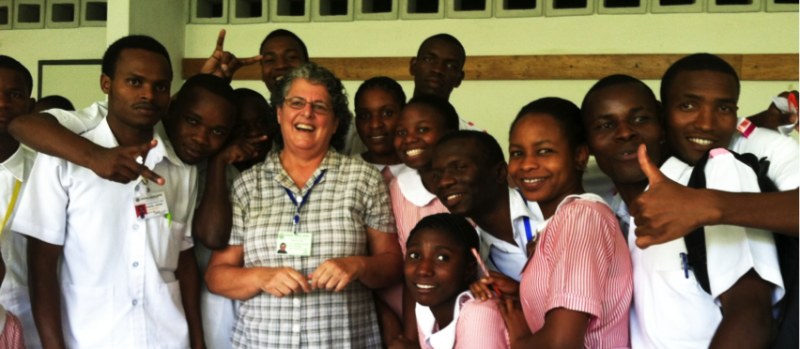Where We Work
See our interactive map


May will be different this year. I have been a nurse for over 40 years, but after teaching nurse midwifery this year in Tanzania, International Day of the Midwife (May 5), National Student Nurses Day (May 8), and International Nurses Day (May 12) will all hold a different meaning for me.
For every 1,000 live births in Tanzania, 4 mothers and 36 infants die.
As T.S. Eliot once wrote, “We shall not cease from exploration, and the end of all our exploring will be to arrive where we started and know the place for the first time.”
Throughout my career, I have worked alongside countless health providers to help care for numerous women. Each time, I relearn what it means to be a nurse caring for women throughout their lifespans.
My year with the Global Health Service Partnership (GHSP) has simultaneously strengthened my clinical acumen, reinvigorated my commitment to ensuring access to high-quality health care, and deepened my understanding of what it means to be a successful nurse, midwife, teacher, learner, mother, and grandmother.
As a GHSP volunteer, I teach nurse midwifery classes to 44 second-year diploma nursing students and 29 bachelors nursing students, both in the classroom and at the bedside.
Regardless of location, investing in health education is essential to the future health of a population. However, in places such as Tanzania—where the maternal and infant mortality rates are alarmingly high and the number of health professionals is distressingly low—the education of these nurse midwifery students is vital.
For every 1,000 live births in Tanzania, 4 mothers and 36 infants die. By comparison, the maternal mortality rate in Tanzania is 14 times higher and the infant mortality rate is 6 times higher than in the United States.
Tanzanian women frequently do not name their babies until months after birth, out of fear the babies will not survive.
I have learned that Tanzanian women frequently do not name their babies until months after birth out of fear the babies will not survive, and that many people do not have time to think about the future as they are often struggling just to get by each day.
During my time in Tanzania, I have seen how limited resources and infrastructure, frequent power outages and poor internet, and perilous health and safety situations make just living incredibly challenging. Too many times I have seen students having to cope with the death of a family member or struggling with finances.
However, I have also seen the beauty of this country. The friendliness, curiosity, and resilience of my colleagues are comforting and encouraging, and despite often bleak realities, the resolve and optimism of my students is inspirational.
It is this approach of my Tanzanian colleagues, one of tenacity and determination, that has reinforced for me the importance of attitude as a key component of what makes a successful nurse midwife.
With enough instructors and resources, students can learn to think critically and perfect their clinical skills. Attitude, on the other hand, is harder to teach.
Attitude is based on values, experiences, role models, and the ever-fluid relationship of hope and reality. My young students are my heroes and heroines as they deal with so much adversity yet remain excited about learning and changing the status of nursing and nursing education in Tanzania.
With these students already demonstrating an eagerness to learn and a steadfast dedication to the profession, I only hope that as a GHSP volunteer I am able to equip them with critical nurse midwifery expertise to propel them forward in their careers so that they can improve maternal health outcomes in Tanzania. To address the dire shortage of health professionals worldwide, the Global Health Service Partnership (GHSP), a public-private partnership between the US President’s Emergency Plan for AIDS Relief (PEPFAR), the Peace Corps, and Seed Global Health, sends US doctors and nurses to work alongside faculty at partner institutions in Malawi, Tanzania, and Uganda to help educate and mentor the next generation of local medical and nursing professionals.
Photo courtesy of Deborah Goldman and Seed Global Health.
Get the latest updates from the blog and eNews




